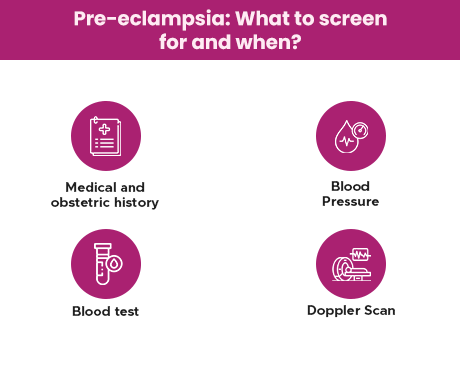
What is Pre-eclampsia ?
Pre-eclampsia is a pregnancy complication which appears as high blood pressure and develops in the second half of pregnancy. It is characterized by hypertension and proteinuria or maternal organ dysfunction in absence of proteinuria. It is a medical condition that only develops during pregnancy and affects around 2-5 % of pregnant women.How does Pre-eclampsia happen?
Current understanding suggests that pre-eclampsia is a two-stage process. The first stage is caused by shallow invasion of the trophoblast resulting in inadequate remodeling of the spiral arteries. This is presumed to lead to the second stage, which involves the maternal response to endothelial dysfunction and imbalance between angiogenic and antiangiogenic factors, resulting in the clinical features of the disorder.What are risk factors for pre-eclampsia?
Number of maternal risk factors are associated with pre-eclampsia treatment. These are advanced maternal age, nulliparity, previous history of preeclampsia, long pregnancy intervals, assisted reproduction , family history of preeclampsia, obesity and certain comorbidities like diabetes ,pre-existing chronic hypertension, renal disease, and autoimmune diseases such as systemic lupus erythematosus (SLE) and antiphospholipid syndrome (APS).How does Pre-eclampsia affect the baby and the mother?
Pre-eclampsia is associated with decreased blood supply to the placenta leading to impaired fetal growth, preterm birth and increased risk of stillbirth. It can also lead to serious complications in the mother.What is Pre-eclampsia screening ?
Early detection is important to effectively manage pre-eclampsiaand ensure a healthy pregnancy. Pre-eclampsia screening means predicting the risk of disease early in pregnancy and offering interventions to individuals at high risk for improving pregnancy outcomes.How do you screen for Pre-eclampsia and why is it important?
Pre-eclampsia screening involves taking maternal medical and obstetric history, measurement of blood pressure in each arm, ultrasound assessment of uterine artery blood flow and maternal blood tests like PLGF and sFLT-1 to predict the risk of preeclampsia. The main objective of screening is to identify cases at high risk that will benefit from early interventions such as prophylactic use of aspirin and frequent maternal and fetal monitoring.
What happens if the screening test result is high risk in the first trimester?
A woman is considered high risk when her first-trimester combined test, including maternal risk factors, MAP, PLGF, and UTPI, shows a 1 in 100 chance or higher.
High-risk women are advised to take 150 mg of aspirin once daily before bed, starting from the time of risk assessment until 36 weeks of pregnancy. The ASPRE trial found that aspirin use reduced the incidence of preterm pre-eclampsia by 62% and pre-eclampsia before 34 weeks by 82%.
High-risk women should frequently monitor their blood pressure and regularly check the fetus to ensure the baby’s well-being and detect any potential effects of pre-eclampsia.
Note – Women in the low risk group require reassessment of risk at 22 weeks.
**No first or second-trimester test or set of tests can reliably predict the development of all cases of pre-eclampsia
What is the treatment for Pre-eclampsia?
Treatment for pre-eclampsia primarily involves managing blood pressures and monitoring both mother and baby closely. In severe cases, early delivery may be necessary for both mother and the baby’s well being.
Is it safe to have another pregnancy after Pre-eclampsia?
Yes, but you should work closely with your Obstetrician and Fetal Medicine specialist to monitor your health and manage any risks.
Ensuring a Safe and Healthy Pregnancy with Comprehensive Preeclampsia Screening
Preeclampsia is a pregnancy condition that requires careful monitoring and timely intervention. Each trimester has its own set of screening protocols designed to detect and manage preeclampsia effectively. For comprehensive preeclampsia screening and management throughout your pregnancy, consider Garbh. We offer specialized preeclampsia screening tests and expert care to ensure both maternal and fetal health. Schedule an appointment with us or contact us at +91 7087204818 to ensure a safe and healthy pregnancy journey.

